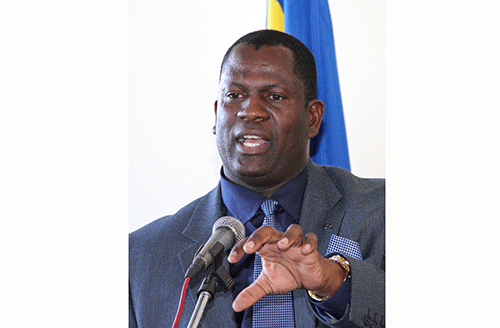OKAHANDJA – For restorative justice and just reparations for the 1904/08 genocide to be attained, unity and a collaborative relationship with the Namibian government is of supreme importance.
Paramount chief of one of the Ovaherero Traditional Authority (OTA) factions, Hoze Riruako advanced this argument during an interview with New Era.
The academic shot down rampant perceptions that the Namibian government is a non-entity in the ongoing fight to get the German government to atone for the atrocities it committed during the first genocide of the 20th century.
“There are some ill-informed and self-serving factions within our communities that are of the opinion that when a Herero chief calls for unity amongst ourselves and a working relationship with the Namibian government of the day, then he is a sellout. That is a very regressive way of thinking and does not serve the greater interest of our people.
“The current government, irrespective of one’s political affiliation or tribe, is there to serve the interests of all Namibians, including those of the OvaHerero people. So, in our ongoing fight for reparations and restorative justice for all our people, I will continue to call for a mutually beneficial working relationship with government where and when needed,” said Riruako.
The government, Riruako said, cannot be wished away.
“Namibia is independent and we have a government in place. And as some people would have liked, we, unfortunately, can’t wish it away. I’m not saying government should replace us the traditional chiefs at the negotiating table, but I’m simply stating the fact that our government should hold hands with us and sit next to us at the negotiating table with the Germans. That is the kind of working relationship I’m talking about and that relationship must exist if we are to fully succeed as a people and as a country. Government is not the enemy here, but the enemy is those self-anointed traditional leaders who are trying to use that narrative to further divide us,” he said.
Riruako, a nephew of the late OvaHerero paramount chief, Kuaima Riruako, further stated that his tenure will be one centred around unity, inclusive leadership and mutually beneficial collaborations with the government.
“The Germans have been riding on our disunity for far too long now, and while we are over here fighting each other and bashing our government; they [Germans] are further solidifying their arrogance and repudiation of the genocide. I have constantly made it clear that government must respect our position in this matter and must equally understand that we have a leading role to play here and they have a very imperative supporting role to play as well. Where it benefits the OvaHerero and Namibians at large, I stand ready to work with and hold hands with government,” he added.
The Herero and Nama genocide was a campaign of ethnic extermination by the German colonial government.
It was the first genocide of the 20th century and occurred between 1904 and 1908. An estimated 100 000 Hereros and 10 000 Namas died in the genocide.
The first phase of the genocide was characterised by widespread death from starvation and dehydration, due to the prevention of the Herero from leaving the Namib Desert by German forces.
Once defeated, thousands of Hereros and Namas were imprisoned in concentration camps, where the majority died of diseases, abuse, and exhaustion.
His comments come at a time when the German government has refused to budge to criticism that alongside their Namibian counterpart, they have violated the rights of Nama and OvaHerero communities by excluding them from genocide talks.
In May, United Nations special rapporteurs criticised both Namibia and Germany for violating the rights of OvaHerero and Nama ethnic minorities by excluding them from talks over reparations for colonial crimes against their ancestors.
The UN representatives called on Germany to take full responsibility for all its colonial crimes in Namibia – including mass murder.
To this, Germany retorted: “The initialled joint declaration reflects the shared understanding of the two sides of the events between 1904 and 1908 on the territory of what is now Namibia and concludes, with reference to the preamble of the Genocide Convention of 1948, that the abominable atrocities committed during periods of the colonial war culminated in events that, from today’s perspective, would be called genocide.”
“On this basis, it states Germany’s moral, historical and political obligation to tender an apology for this genocide and subsequently provide financial means for reconciliation and reconstruction programmes. It envisages a formal apology from Germany, and the acceptance of this apology by the Namibian side.”
Meanwhile, talks between the two governments have seemingly hit a stalemate.
At the moment, Germany has offered a paltry 1.1 billion euros (N$18 billion) for developmental projects in seven identified regions as reparations for genocide, in juxtaposition to Namibia’s N$1.1 trillion demand.
The latter figure takes into account loss of life, dispossession of land and displacement, amongst others.
“Hopefully, we will reach a figure which Germany is ready to give, and which Namibia is ready to accept,” Vice President Nangolo Mbumba, who spearheads genocide talks on behalf of government, said last year.
Another issue that does not sit well with affected communities, the Namibian government and opposition parties, is the N$18 billion reparation offer which Germany has proposed to pay over 30 years.
– ohembapu@nepc.com.na



